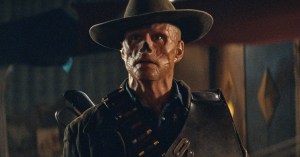SUNDANCE: Interview with "Beyond Beats and Rhymes" Director Byron Hurt
When Byron Hurt quit his job and drove to New York, he had $3,000 to his name and virtually no contacts in the movie business.
"I remember driving in my U-Haul truck with all my stuff in the back on the Brooklyn Queens Expressway, and looking at the New York skyline, and I was saying to myself, ‘Man, you must be crazy.’"
"I was terrified when I quit my job, but that fear is what gave me the energy and the drive to be successful at it," he said. "My motto was, ‘Failure is not an option.’"
Six years later, Hurt was at Sundance as the director of the thought-provoking documentary "Beyond Beats and Rhymes: A Hip-Hop Head Weighs in on Manhood in Hip-Hop Culture."
"I’ve heard that it’s been getting a lot of good buzz, a lot of press," he said. "Aside from just being grateful for being here, for being selected into Sundance, it’s just a great honor to get to this point after so many years of working on the film and knowing in my heart that I had something really special that had a lot of possibilities."
The film combines revealing video clips and sharp interviews with well-known and aspiring rappers, intellectuals, and people on the street. The focus of "Beyond Beats and Rhymes" is how being "hard" is often a stand-in for homophobic or sexist posturing.
But Hurt also turns the camera on himself, and reveals both his love for the music and the ways in which his views have evolved.
"I wanted this film to be more about my conflict, because you know what? There are a lot of hip-hop fans who are conflicted about hip-hop," he said. "There are people who have problems with the hypermasculinity, have problems with the misogyny, have problems with the homophobia, the materialism, but they still love hip-hop."
"People who grew up going to house parties and college parties, we love hip-hop," he said. "But we don’t like where hip-hop is. We don’t like the direction it’s taking. And I’m just being honest about that."
Part of the issue, according to Hurt, is that record companies and music video outlets are making money off this narrow view of what hip-hop, and by extension, the African American experience, is.
"There are some people who don’t have a problem with it," he said. "The most important thing (to them) is that hip-hop is a commercially successful art form that’s putting a lot of money into people’s pockets, including big corporations."
But Hurt also noted that his love for the music allows him a better vantage point from which to comment; he’s not a politician or a pundit.
"I wanted to make it for people who knew and understood hip-hop," he said. "I knew at the end of the day I had to show it to those people, and I would never want to be flat out dismissed by the hip-hop community or my boys who listen to hip-hop."
"I’ve been walking this fine line, because I want to break new ground, but I don’t want to be seen as somebody who’s saying it from the outside," he said.
Hurt’s first film, "I Am a Man: Black Masculinity in America," was rejected by PBS nationally (though it did screen on some local affiliates and played at a number of colleges). Hurt said some of the criticisms of the film were valid, but he was badly shaken by the experience.
"They were right on a certain level, but it devastated me, and it really damaged my confidence for a long time," he said.
Hurt took a public relations job at his alma mater, Northeastern University, but he spent much of his time on the job thinking about making movies.
"Every meeting I walked into I was thinking about my next film," he said.
So he left, and moved in with his parents on Long Island, ready to jump back into moviemaking. But something about the word "filmmaker" flummoxed him, he said.
"I was scared to call myself a filmmaker, because there’s a certain commitment you’ve got to make when you call yourself that," he said. "It means you’ve got to make films. You’ve got to find money to make films. And I was always overwhelmed with the process of finding funding and stuff like that."
When he went to New York City, Hurt had contact information for director/producer Stanley Nelson; after calling him incessantly, he got a gig as a production assistant on Nelson’s film "Marcus Garvey: Look for Me in the Whirlwind."
The job paid off; after Hurt raised some funds for "Beyond Beats and Rhymes," Nelson became his executive producer, and helped raise more money for the film.
Hurt was working hard, trying to get as many interviews as he could, and he ended up with an impressive list: Chuck D, M-1 of Dead Prez, Talib Kweli, Mos Def, and Russell Simmons (who answered Hurt’s questions, albeit reluctantly).
"I just beat the pavement," he said. "Before I started shooting anything, I went to any and every hip-hop event in the city where I knew there were going to be rappers, and I told them what I was doing."
Hurt said he hopes the film, which will air on PBS in the coming year, will be entertaining to a wide audience.
"We worked hard to make a film that was thoughtful and entertaining, and accessible," he said. "Even if you don’t know a whole lot about hip-hop, you’ll be drawn into the film."
And while he knows he can’t change the attitudes of music listeners and artists overnight, Hurt said he hopes the movie makes people stop and think about the direction of hip-hop.
"I know this is only a film. I think I have realistic expectations on how this film could make a difference in the music industry," he said. "[But] I want people, when they watch the film, to listen to hip-hop from a different lens, to see it differently than they saw it previous to watching my film."
Check out Sundance features by Rotten Tomatoes:
• Sundance Full Coverage
• Sundance Blog
• Sundance Discussion





